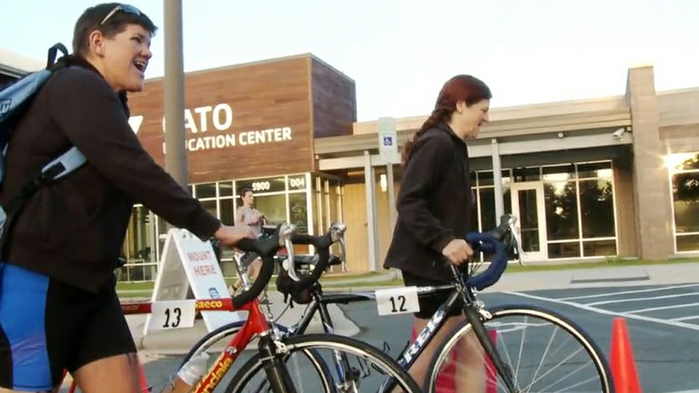Contrary to widespread belief, weight-loss surgery is not a quick way to effortlessly shed pounds. Having a gastric bypass or vertical sleeve procedure that reduces the size of the stomach is not a fast fix.
Chris Bolo, clinic administrator for Novant Bariatric Solutions in Charlotte, wants potential bariatric surgical candidates to be aware that an all-in commitment from them is crucial. Bolo answers questions about the procedure and talks about what to expect before and after surgery.
What’s the biggest misconception about weight loss surgery?
Many people think: You have the surgery, you lose the weight and that’s it. But there are lifestyle changes and behavior modifications patients have to make. You can gain the weight back if you have not committed yourself to the lifestyle changes necessary for success.
While our patients want to lose weight, what they really want is a better quality of life, along with an improvement of the chronic diseases brought on and exacerbated by their disease of obesity. Every patient is different. We must treat each patient with an individual plan for long-term success.
What do you do to try to ensure your patients are successful?
Initially, we steer our patients to our online seminar, which is where they can view our program firsthand, learn about the different types of surgeries, and fully understand the lifestyle changes and behavior modifications necessary for any bariatric surgical patient’s success. Bottom line: Surgery is just a tool for weight loss.
If a patient is ready to commit after knowing all the requirements, we send them through a “bariatric surgical pathway.” The patient’s pathway consists of criteria that must be completed for a patient to be cleared medically for surgery. Patients must have nutrition counseling and clearance, behavioral health assessment and clearance, exercise education, metabolic testing and body composition testing. Our pathway is designed to provide the necessary education to ensure the best outcomes long term.
Don’t you need to weigh a certain amount to qualify?
For insurance to cover the surgery — and most will — you have to have a minimum BMI (body mass index) of 40. (Click here for a calculator.) In most cases, insurance will cover a BMI lower than 40 if the patient demonstrates certain conditions. These conditions include failed attempts at weight loss, and being treated for one or more chronic diseases recognized by their insurance company.
Novant Health Bariatric Solutions will work with the patient’s insurance company to verify benefits that are necessary for surgery along with ensuring coverage for treatment within the patient’s surgical pathway. Many insurance carriers do have a bariatric benefit. However, some carriers have more stringent requirements, so it’s important to know all the requirements to determine when a patient can have surgery and an estimate for the patient’s out-of-pocket costs.
Based on the insurance criteria — along with the criteria that our own group requires to be completed and the patient successfully clears — the patient needs to have a realistic expectation for when they will go to surgery. The patient will be able to discuss an approximate surgery date with their provider and bariatric pathway adviser.
How does family play a key role?
Patients will need more than the support of our team to be successful. If members of their family and/or support system — who may also be overweight — continue their same poor eating and lifestyle habits, that will be a challenge for patients. We reinforce healthy lifestyle workshops and support groups and encourage the patients and support team to attend. Support is key for any bariatric patient for a lifetime.
What about the behavioral component? Why does that matter?
For binge eaters, emotional eaters and people with food addictions, it matters a lot. There are many factors that play a role in the causes of the disease of obesity. It is vital for patients to understand why they need to have medical intervention. And, yes, some of those causes are behavioral and are chronic in nature. Just because a patient has bariatric surgery doesn’t make these causes go away. But with awareness and resources that our behavioral health team can provide, the patient can work through these causes and identify them. This is where the behavioral modifications and lifestyle changes can be key factors in long-term success.
Many of our patients come to us depressed and angry. It’s our job to make patients feel comfortable, motivated, engaged and heard. We always tell patients: “We’re here to help you, but we can’t do it without you.”
How can you tell who’s going to be a successful with their weight loss journey?
Compliance and engagement are key. Is the patient coming to all their appointments? Are they keeping a food journal? They should not be putting on weight in the months leading up to surgery.
You offer a lot of support before surgery. What about after surgery?
After the initial 12-week follow-up, patients also are scheduled for six- and 12-month post-surgical visits. We will see the post-surgical patients once a year for the rest of their life. We also offer monthly support groups at all of our locations, as well as workshops designed to assist patients at every stage of their weight loss journey.
What if a patient can’t make lifestyle changes needed for surgery?
If surgery isn’t right for someone, we talk to that patient about nonsurgical options that we offer within our group. These programs are also centered on behavior modification, lifestyle changes and possibly medication. Patient education is key. We want people to understand that surgery is actually just a small piece of this lifelong journey to optimum health and wellness.
For information on Novant Health weight loss services, click here.







